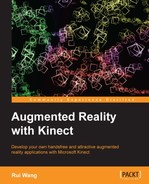Congratulations! We have already finished all six chapters of this book. We have learned how to install and configure the Kinect SDK, how to initialize it and obtain image-streaming data into OpenGL textures, how to get a player skeleton and use hand positions to emulate multitouch inputs and gestures, and how to design a comparatively complete Fruit Ninja game using these features. Now you can feel free to make use of the mighty Kinect and its APIs to develop your own applications.
But before that, in this last chapter we will provide some extra ideas about Kinect programming. First, we will have a quick look at two third-party SDKs that can replace the functionalities of the Microsoft Kinect SDK. For non-Windows developers, they are always preferred as alternative middleware. Then, we will introduce some open source and commercial software based on Kinect, and even some hardware solutions that can be considered for motion-sensing uses.
The Kinect sensor was first launched for Xbox 360 game consoles in November 2010, but the first distribution of the Kinect SDK for Windows was released in June 2011. During the interregnum, many hackers and programmers had published their methods to drive and use Kinect features, which were extremely attractive to new media artists and developers. So here come the libfreenect and OpenNI libraries.
libfreenect was born in the race of hacking Microsoft Kinect in early November 2010. Héctor Martin made his code open source on GitHub, a famous social coding host. And this is the rudiment of libfreenect. Now this library is maintained by the OpenKinect community; it can be downloaded at:
- The community page: http://openkinect.org/wiki/Main_Page
- The GitHub source repository: https://github.com/OpenKinect/libfreenect
The libfreenect library can be used with Linux, Mac OS X, and Windows. Currently, it supports RGB and depth images through the Kinect USB camera. It has a planning analyses library that provides skeleton tracking, hand tracking, audio, point cloud, and 3D reconstruction features. But it has still not been released at the time of writing. libfreenect also supports different programming languages besides C/C++, including C#, Java, Python, Ruby, and ActionScript.
As an open source project, you can contribute to libfreenect at any time under the license of Apache 2.0 or GPL 2.1 (optional).
